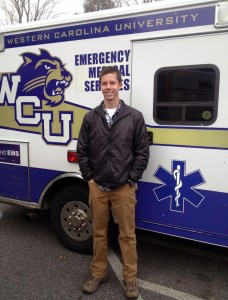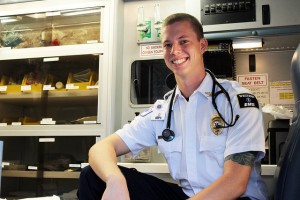Beep…beep…beep, the alarm from the radio beside the bed is going off at 4 in the morning. Behind the alarm there is a muffled voice telling you some very important information. You have to get out of bed, get dressed, understand the voice behind the alarm, and speed off in a truck to go save someone you’ve never met. On top of all of that, you have to attend your 8 a.m. pharmacology class. This is what it means to work in the EMS (emergency medical service) at Western Carolina University.
WCU EMS is a student run, fully working base on campus. It is 45 years old. There are 6 officers that live up on the base. Some studying to become paramedics and some studying subjects not medical related at all. WCU EMS is important to WCU’s campus because they are the first responders for 911 calls from Western Carolina’s campus.
Taner Campbell is the chief of EMS 1101 and a full time student at Western Carolina University studying emergency medicine. His responsibilities include overseeing all aspect of the organization at WCU EMS. He works full time as EMS chief.
His dream of becoming a full time paramedic started when he was only 12. When his sister had a grand mal seizure. He watched as his mother frantically tried to keep her from hurting herself even more from the thrashing.
“Throughout the entire thing I felt useless and I didn’t know what to do. I hated the helpless feeling.”
That was the moment he decided to become an EMT. Plus the kids like dreams of the shiny lights and being one of the modern day heroes.
He started as early as he could. Taking the courses needed to get his certification and volunteering at the local fire department in Charlotte, NC at the age of 14. He has been on the ambulance, in Cullowhee, North Carolina at 18 and with WCU EMS for three years now.
The typical call for the EMS is small injuries and small sicknesses but every once in a while there is a big call that stirs things up at the base.

photo taken from Taner Campbell’s Facebook
One night he was working when around 4 in the morning a call was dispatched. Dispatched had advised that the caller was unsure if the patient was breathing. He and his partners got up, jumped in the truck and ran the sirens all the way to the location of the call. So far they know nothing. The patient, a student, could be breathing or not. They know that the 911 operator had started to give instructions to the caller on how to give CPR. They had no idea what to expect once they had their boots off the ambulance. Then all of a sudden they heard over the radio the words: “Cardiac Arrest”.
“When I get a serious call, I don’t feel much right in that moment. The only thing on my mind is my patient and what I need to do to give them the best possible care. You “feel the call” after you depart the scene,” Campbell explained.
It can almost get compared to going to the doctor to get a small paper cut looked at and it turning out that you have cancer . The call just hit an all-new high of urgency. They got to the site and get the gear out of the ambulance and locate the patient as quick as possible. When arriving on the scene CPR had not been started and the patient had no pulse. Campbell and his team started chest compression in an attempt to bring this dying student back to life. After compressions had started they placed AED pads on his chest. AED pads are the shocking panels that you see in an hospital movie. Their goal is to jump start your heart back to life. Then after continuous CPR, three shocks to the heart, a tube down the throat and epinephrine there was a pulse. They had successfully brought the student back to life. Campbell and his team had saved their life.
“I had defeated the useless feelings. After “saving” someone, you feel humble and at ease knowing that you did everything in your power to make a difference in what could very well have been the worst day of that patients’ life,” said Campbell.
Campbell is only a junior and will try to continue to lead WCU EMS in a positive direction. WCU EMS will continue to protect students as their staff comes and go. Western Carolina University is in well trained hands so don’t hesitate to call 911 next time you have a emergency.



